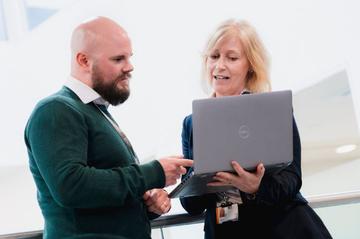Moving on from ‘The Long Goodbye’
Wed 26 Nov 2014
Blog Author
Rachel Burnham
Associate Tutor
Learning Needs Analysis (LNA) is one of the areas at the core of traditional training practice, yet despite this it is one of the areas that students of the Certificate in L&D Practice (CLDP) often have least experience of. I suspect that is because people mostly enter the L&D profession either through first gaining experience of delivering L&D programmes or through involvement in the administration & co-ordination of L&D activities.
‘Undertaking a Learning Needs Analysis’ is one of 8 modules studied as a part of the CLDP offered by MOL. Our approach brings LNA up to date.
We consider this topic, having first explored our own organisations & how they operate, their vision, strategy, values and culture. A crucial point is that L&D needs to be aligned to the requirements of the organisation’s strategy & objectives. We need to ensure that whatever we are doing in L&D, it is addressing the needs of the organisation and contributing to the achievement of those overall objectives. And this also means working with other aspects of HR, such as recruitment, engagement, talent management & performance so that our contributions work together.
Secondly, we link the study of Learning Needs Analysis with making effective use of HR and L&D data. Organisations collect lots of data on performance, quality of work, customer perceptions, effectiveness, as well as staff turnover, sickness & absence levels, completion rates for mandatory training and so on. Much of this information is gathered by functions other than L&D, such as compliance, health & safety or audit teams, yet this information can be so valuable for identifying what is going well in the business and what can be further improved. This is at the heart of LNA.
But the emphasis in LNA has also been changing. I think there are three key changes to be aware of. Three areas to say goodbye to and three to say hello to.
I think we are saying goodbye to an overemphasis on learning and saying hello to giving greater priority to focussing on performance. It may seem counter-intuitive to say we need to pay less attention to learning, but by this I mean that we need to keep our eyes on how individuals, teams and processes are working in practice in our organisations. Any interventions we offer need to make a difference to work performance. In L&D we are not in the business of education, of learning for its own sake. There is a risk, if we just focus on learning, that we don’t pay sufficient attention to whether this learning gets used and whether makes a difference to the performance of the organisation.
Secondly, I think we are saying goodbye to the role of L&D being that of an ‘order-taker’ and saying hello to being ‘consultants’ and to even being performance consultants. In the past too often L&D professionals received ‘requests’ for training programme from line managers and were expected to deliver the programme as instructed, often with a poor understanding of what the line manager wanted to achieve, what the current position was and whether or not training was likely to be able to achieve the needed change on its own. Now we need to act as ‘performance consultants’ rooting out what are the real reasons for poor performance and understanding what drives excellent performance within our own organisation. This means exploring more widely than just gaps in skills or knowledge, to consider other aspects that might be impacting on performance such as communications, conflict, ineffective processes, lack of resources, silo-working and so on.
Thirdly, we need to be saying goodbye to training and particularly face-to-face courses as the default solution and saying hello to a much wider range of learning methods, with much more emphasis on the learner being in control and combining these learning opportunities with other solutions depending on the real nature of challenges the individual, team or organisation is facing. This means that our recommendation from a LNA might be not be a learning solution at all, or a combination of learning & something else or a modern learning mix.
These issues have been around for a while, but as a profession we are taking some time to say goodbye these old ways of working. So join us in saying hello to a more effective approach to Learning Needs Analysis.

Learning & Development
Qualifications
We understand the L&D profession like no other training provider. That’s what makes our courses great.




